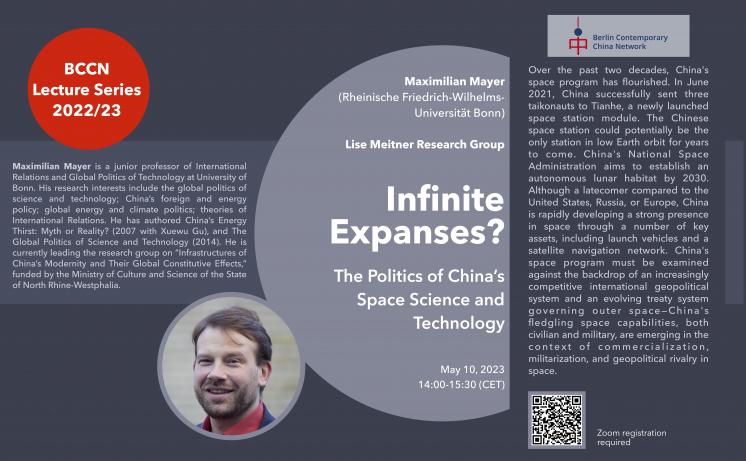May 10, 2023
Infinite Expanses? The Politics of China’s Space Science and Technology
- 14:00 to 15:30
- Lecture
- Lise Meitner Research Group
- Maximilian Mayer (Rheinische Friedrich-Wilhelms-Universität Bonn)
Over the past two decades, China's space program has flourished. In June 2021, China successfully sent three taikonauts to Tianhe, a newly launched space station module. The Chinese space station could potentially be the only station in low Earth orbit for years to come. China's National Space Administration aims to establish an autonomous lunar habitat by 2030. Although a latecomer compared to the United States, Russia, or Europe, China is rapidly developing a strong presence in space through a number of key assets, including launch vehicles and a satellite navigation network. China's space program must be examined against the backdrop of an increasingly competitive international geopolitical system and an evolving treaty system governing outer space—China's fledgling space capabilities, both civilian and military, are emerging in the context of commercialization, militarization, and geopolitical rivalry in space.
Biography
Contact and Registration
Please register at the following link:
https://zoom.us/j/93125029289?pwd=K0s1M1Vsdm1pazBNeTVWRDRwQXZ4UT09
This event is part of the LMRG & BCCN Lecture Series "China—The New Science Superpower?" For further information about the series, specific sessions, or questions concerning registration, please contact office-ahlers@mpiwg-berlin.mpg.de.
About This Series
China’s push to become a leading science power is unprecedented in its speed, scope and, arguably, success. Reactions to China’s rise in global science are dichotomous: some anticipate that science made in China may come to dominate global academia while others deem it impossible to achieve scientific leadership under an authoritarian regime. A focus on rankings and statistics alone is apparently not enough to grasp the origins, characteristics, and the possible futures of China as a science superpower.
This monthly lecture series will bring together fresh empirical insights and intriguing theoretical reflections about the development of the science system in the People’s Republic of China and its global integration. Representing a variety of social science perspectives, our guest speakers will explore the evolution of Chinese science policy, interactions of societal norms and values and academia in the PRC, factors that enable or constrain scientific innovation, the global reception of scientific output and investment from China, the securitization of international collaboration, and much more.


